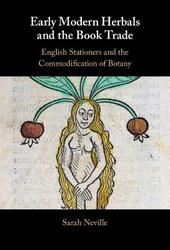
|
Early Modern Herbals and the Book Trade: English Stationers and the Commodification of Botany
Hardback
Main Details
| Title |
Early Modern Herbals and the Book Trade: English Stationers and the Commodification of Botany
|
| Authors and Contributors |
By (author) Sarah Neville
|
| Physical Properties |
| Format:Hardback | | Pages:290 | | Dimensions(mm): Height 235,Width 158 |
|
| Category/Genre | Literary studies - general
Literary studies - c 1500 to c 1800
Botany and plant sciences |
|---|
| ISBN/Barcode |
9781316515990
|
| Classifications | Dewey:070.5094209031 |
|---|
| Audience | | Tertiary Education (US: College) | |
|---|
| Illustrations |
Worked examples or Exercises; Worked examples or Exercises
|
|
Publishing Details |
| Publisher |
Cambridge University Press
|
| Imprint |
Cambridge University Press
|
| Publication Date |
6 January 2022 |
| Publication Country |
United Kingdom
|
Description
Between 1525 and 1640, a remarkable phenomenon occurred in the world of print: England saw the production of more than two dozen editions identified by their imprints or by contemporaries as 'herbals'. Sarah Neville explains how this genre grew from a series of tiny anonymous octavos to authoritative folio tomes with thousands of woodcuts, and how these curious works quickly became valuable commodities within a competitive print marketplace. Designed to serve readers across the social spectrum, these rich material artifacts represented both a profitable investment for publishers and an opportunity for authors to establish their credibility as botanists. Highlighting the shifting contingencies and regulations surrounding herbals and English printing during the sixteenth and early seventeenth century, the book argues that the construction of scientific authority in Renaissance England was inextricably tied up with the circumstances governing print. This title is also available as Open Access on Cambridge Core.
Author Biography
Sarah Neville is Assistant Professor in the Department of English at Ohio State University. She is an assistant editor of the New Oxford Shakespeare and an associate co-ordinating editor of the Digital Renaissance Editions.
Reviews'Sarah Neville's fascinating account of how stationers contributed to the creation of botanical texts brings English herbals and the early modern book trade together for the first time. Her reframing of their history irrevocably alters our sense of their importance for the publishers who commissioned them, the printers who manufactured them, and the booksellers who retailed herbals as well as for the Renaissance physicians, lay medical practitioners, and elite and common readers who so frequently consulted them. Early modern ecocritics will want to read this book along with book historians, historians of science, and those interested in Renaissance literature and culture.' Valerie Wayne, University of Hawai'i at Manoa 'In Early Modern Herbals and the Book Trade, herbals come to life as dynamic objects taking meaning from their print environment. Focusing on the material form of the book provides Neville with a crucial and nuanced tool for unveiling the commercial landscape out of which attitudes toward natural history were indelibly shaped in the early modern era. Rather than relying on an author-centered approach, this book puts printers, booksellers, craftsmen, editors, licensors, translators, playwrights, and readers center stage in the production of botanical knowledge. What we learn is that herbals are much more than repositories of information that mark progress within traditional terms often used by historians of science.' Wendy Wall, Northwestern University 'Informative, penetrating, and witty, Early Modern Herbals and the Book Trade helps us see anew a genre of book we're familiar with largely through their sumptuous illustrations. Immersing us in the fascinating world of botanical publications at the front end of the Enlightenment, Neville has produced a study that anyone interested in the early modern era's engagement with the natural world will want to read.' Douglas Bruster, The University of Texas at Austin
|